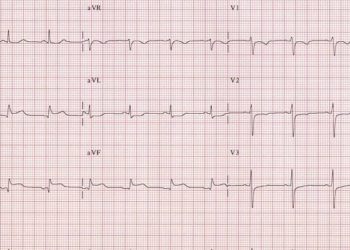Recurrence is high in patients with transient atrial fibrillation during hospitalization
1. In this matched cohort study, approximately one in three patients who had transient new-onset atrial fibrillation (AF) during hospitalization had recurrent AF within one year.
2. Most study patients with recurrent AF were detected by electrocardiogram (ECG) patch monitor only.
Evidence Rating Level: 1 (Excellent)
Study Rundown: AF is a common arrhythmia associated with increased risk for stroke, heart failure, and death. AF that occurs transiently with stress often refers to AF that is detected for the first time in patients who have been hospitalized for another medical or surgical condition. While certain studies have shown a higher risk of AF recurrence in patients with atrial fibrillation that occurs transiently with stress, there is a gap in knowledge as to understanding the risk for AF recurrence after hospital discharge among patients with transient new-onset AF during hospitalization for noncardiac surgery or medical illness. Overall, this study found that among patients who experience new-onset AF during hospitalization for noncardiac surgery or medical illness and are discharged in sinus rhythm, approximately one in three will have AF in the year after hospital discharge when assessed systematically. This study was limited by not assessing the efficacy of oral anticoagulation and limited generalizability. Nevertheless, these study’s findings are significant, as they demonstrate that approximately one in three patients with transient new-onset AF during a hospitalization will experience recurrent AF within a year.
Click to read the study in AIM
Relevant Reading: Risk for Bleeding-Related Hospitalizations During Use of Amiodarone With Apixaban or Rivaroxaban in Patients With Atrial Fibrillation
In-Depth [retrospective cohort study]: This matched cohort study was conducted at three academic hospitals in Canada. Patients who had no history of AF with AF detected during hospitalization for a noncardiac reason, and who returned to sinus rhythm (either spontaneously or via electrical or pharmacologic cardioversion) before hospital discharge were eligible for the study. Patients who had a documented history of AF before hospitalization; the presence of an implanted pacemaker or defibrillator; or an admission diagnosis of stroke, myocardial infarction, heart failure, pericarditis, or arrhythmia were excluded from the study. The primary outcome measured was the detection of AF lasting at least 30 seconds on the study device or another continuous ECG monitor during routine clinical care, or AF detected on a 12-lead ECG performed as part of routine clinical care. Outcomes in the primary analysis were assessed via a binomial distribution with a logit link and a stratum variable. Based on the primary analysis, recurrent AF was detected in 33.1% (95% Confidence Interval [CI], 25.3% to 40.9%) of participants in the transient new-onset AF group and 5.0% (95% CI, 1.4% to 8.7%) of matched control participants after one-year. When adjusting for number of ECG monitors used and baseline clinical differences, the adjusted relative risk was 6.6 (95% CI, 3.2 to 13.7). When the study excluded patients who had electrical or pharmacologic cardioversion and their matched control participants, AF was detected in 32.3% (95% CI, 23.1% to 41.5%) of participants with transient new-onset AF and 3.0% (95% CI, 0% to 6.4%) of matched control participants for recurrent cases. In summary, this study demonstrates that approximately one-third of patients with new-onset AF during rehospitalization experience recurrent episodes.
Image: PD
©2023 2 Minute Medicine, Inc. All rights reserved. No works may be reproduced without expressed written consent from 2 Minute Medicine, Inc. Inquire about licensing here. No article should be construed as medical advice and is not intended as such by the authors or by 2 Minute Medicine, Inc.






![Novel biodegradable sirolimus-eluting stents non-inferior to durable everolimus-eluting stents [BIOSCIENCE trial]](https://www.2minutemedicine.com/wp-content/uploads/2014/09/Taxus_stent_FDA-e1607803635904-75x75.jpg)


